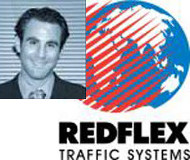10/26/2017
Top Redflex Exec Renews Push For Settlement CashEx-Redflex executive vice president asks US Court of Appeals for millions after he snitched on the Chicago, Illinois bribery scheme.

As soon as federal authorities began investigating Redflex Traffic Systems, Aaron M. Rosenberg immediately began snitching on his colleagues. The Australian firm's former executive vice president escaped any prison sentence for his central role in the massive bribery scandal that sent his boss to prison, but he now seeks an even greater reward. In a newly filed argument filed with the Seventh Circuit US Court of Appeals, Rosenberg renewed his demand for a $2.3 million pay day as a whistleblower.
"Rosenberg's 162-paragraph complaint alleged in painstaking detail a decade-long bribery scheme perpetrated by Redflex Traffic Systems Inc, providing song, chapter, and verse about how the bribery scheme began, how it worked, who was involved, and how Redflex Traffic Systems Inc profited from it," his attorney, John J. Muldoon III wrote. "All of these allegations came directly from Rosenberg's own personal knowledge as the lone Redflex insider who was willing to tell the truth about what the company had done."
To get the cash, Rosenberg would have to convince a three-judge appellate panel to overturn the April ruling of a district court that found Rosenberg was engaging in "linguistic gymnastics" to justify an attempt to profit from his crimes (read ruling).
Rosenberg and his ex-boss, Karen Finley, doled out $2 million in bribes to land the red light camera contract in Chicago, Illinois that ultimately earned Redflex $125,904,645 over the life of the contract. Under the Windy City's False Claims Ordinance, Redflex faced the potential of a $300 million fine for its misdeeds, but the city decided to settle for just $20 million. Rosenberg claims he is entitled to a ten percent fee for his work in filing the lawsuit that brought in the settlement cash.
To make his argument, Rosenberg is now describing the Redflex business model in extreme detail, pointing out that the bribery was not in any way limited to Chicago.
"From the company's inception in the United States, Redflex directed and encouraged its employees to use gratuities to curry favor with actual and potential customers," Rosenberg's lawyer wrote. "Lunches and dinners at high end restaurants, outings to golf and significant events (like Chicago White Sox baseball games), travel expenses, and gifts were all authorized and encouraged. Redflex employed the systematic use of such gratuities nationwide."
Rosenberg argues that he provided prosecutors with far more information than was available to the public from the investigations published in the Chicago Tribune newspaper, and that the lower court judge erred by asserting otherwise. He suggests that it is "likely" that the city leaked the information its investigators obtained from Rosenberg to the Tribune.
"This issue was not fleshed out at the district court because the lower court erred by not allowing [Rosenberg] an evidentiary hearing," Muldoon wrote. "Rosenberg is certainly not a parasite with no significant information to contribute. Just the opposite, he was the only Redflex employee to come forward and speak truthfully about Redflex's bribery scheme."
The city of Chicago has until November 17 to file its reasons why Rosenberg is not entitled to a cut of the $30 million settlement windfall.


